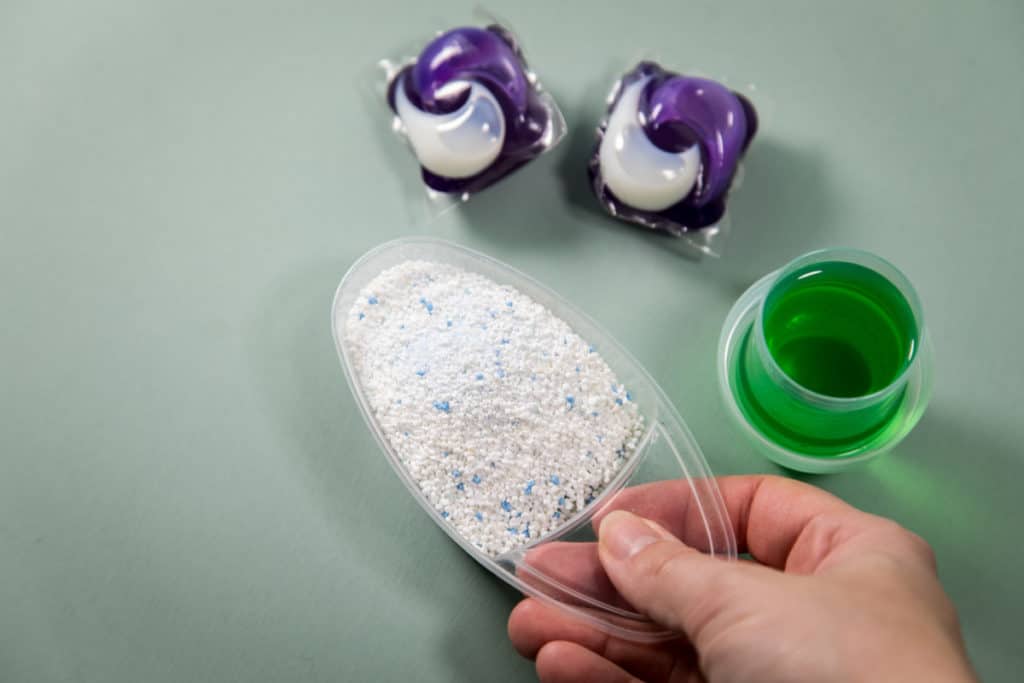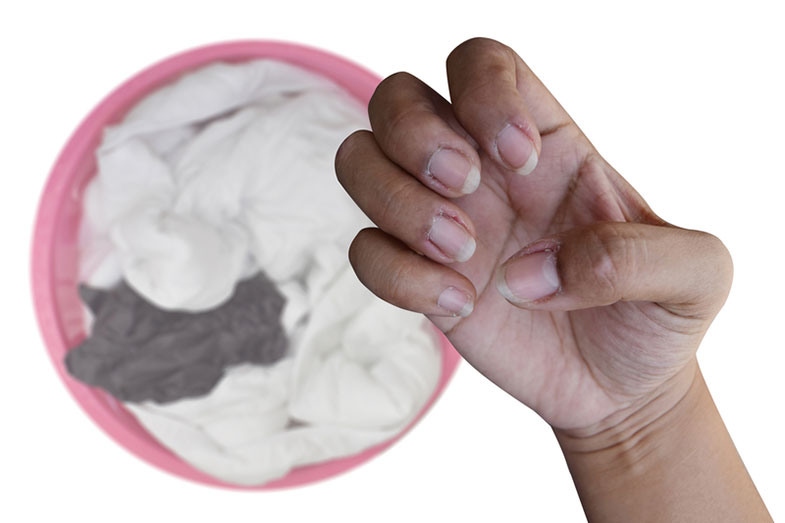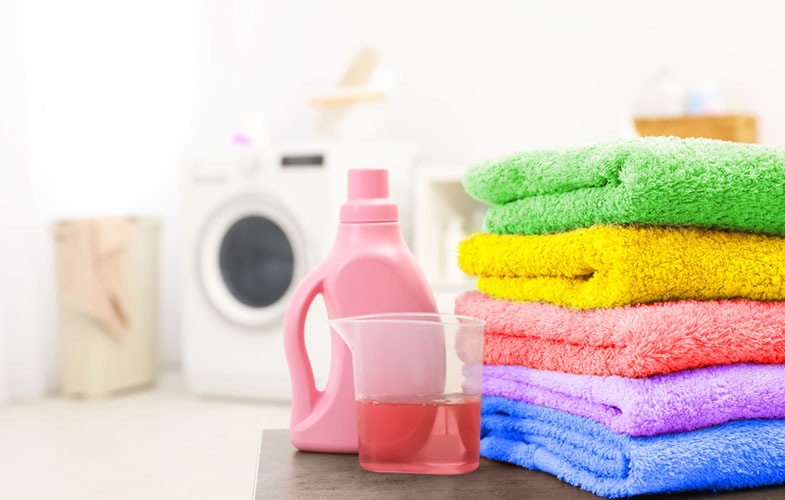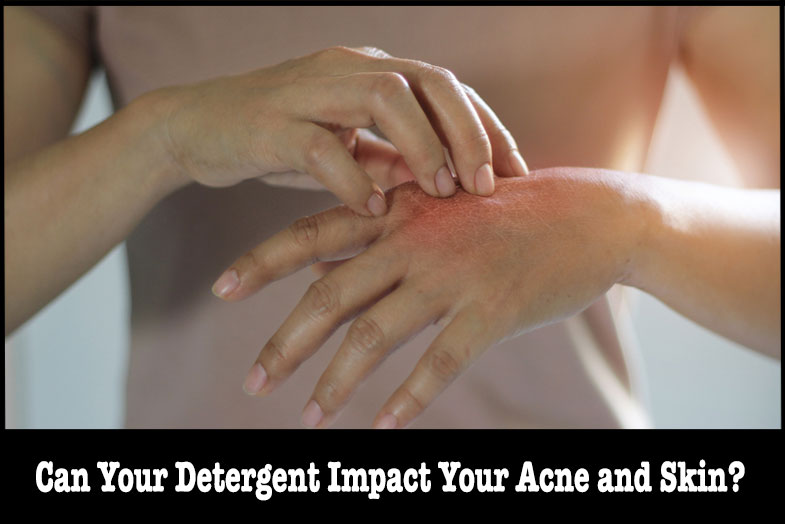Do you want to see your acne getting worse? Keep using detergents with skin allergens in them. This is a harsh reality that we all are unaware of. Some people do know what can be the possible consequences of using laundry detergent, yet they continue to use it blindfolded.
Some ingredients present in the laundry detergent can possibly irritate your skin. These ingredients are usually scents, fragrances, and dyes. Depending upon the sensitivity of your skin, various chemicals in laundry detergent can trigger acne on your skin.
We all are not unaware of the harmful effects of laundry detergent in our daily life. It can be the cause of some major health problems. At the same time, surfactants are already threatening the lives of thousands of aquatic animals.
Why should I Blame Laundry Detergent?

Sometimes the break out that occurred on your face is not because of the skincare or makeup products. These products are inevitably always the reason behind acne on your face. But I have witnessed a condition where topical products were not responsible for the breakout; laundry detergent was.
Laundry detergent is used on clothes; how can it be the reason behind skin problems? Well, we wear clothes washed with laundry detergent. Every day we come in contact with various fabrics washed with detergents like that of our bed, curtains, and sofa.
Dozens of chemicals in the laundry detergent can be a reason for skin irritation. It has been confirmed that some of those are actually skin allergens. Surfactants can be considered one of them. In detergents, they play the role of reducing the surface tension of water. However, harsh surfactants can be highly damaging for people with sensitive skin.
Read More: What Makes Laundry Detergent Eco- Friendly?
Causes
Surfactants
Talking about skin irritants and not considering surfactants? That would be an incomplete discussion. If you don’t know already, surfactants are a class of chemicals that lower the surface tension between two liquids. In this way, dust particles easily suspend in the water, making their removal even more effective. Oil stains and other sticky dirt particles get removed easily due the presences of surfactants in laundry detergent.
These chemicals are widely used in detergents, foaming agents, emulsifiers, and several skincare products.
Surfactants are classified as nonionic, anionic, cationic, and amphoteric surfactants. The laundry products that we commonly use contain anionic surfactants. SLS (Sodium lauryl sulfate) is a common anionic surfactant that is used in detergents. It is an active ingredient, which is also known to cause skin irritation.
SLS is just a skin irritant and not a carcinogen. It is also found in topical products, where it is present in a very small amount. In a study, it has been found that SLS concentration should be more than 1 percent if the product is to stay on the skin for a longer time.
There is a better alternative to SLS, called SLES. It is also an anionic surfactant but less harsh than SLS. SLES is safe for the skin. This means if your detergent contains SLES, you don’t have to stress about any skin problem.
Fragrances
We have been brainwashed by these big detergent companies in the sense that as long as your clothes smell fresh, they are clean. However, this should not necessarily be true.
The scent that we smell after washing clothes is of several chemicals. They can be synthetic and natural. The synthetic chemicals added to the laundry detergent are inevitably always harmful to our bodies.
Today, our desires have become so high that we judge a laundry detergent by the scent it gives. For this reason, many detergent industries have started adding scent boosters, which give off a fresh smell for weeks. The pleasant smell that lingers on our clothes can be the reason for several skin problems.
Scented laundry products cause more damage to people with sensitive skin than others. Even if you don’t have sensitive skin, it is likely that you will face the problem as these scented chemicals are way too harsh.
Preservatives
Methylisothiazolinone (MI) is a common preservative that is used in laundry detergents. Other than laundry detergent, this preservative is used in personal care products. It has antimicrobial properties, but at the same time, this preservative is a very common allergen. Due to its skin irritant properties, MI is removed from the list of ingredients by big detergent companies.
In the US, the concentration of this ingredient added to rinse-off products is 15 ppm. This chemical is also added to cosmetic products. However, MI has been detected as an allergic chemical majorly linked to irritant reactions. Since then, it has been removed from the majority of cosmetic products.
Other than these ingredients, there are some other chemicals found in the laundry detergent that can be a reason for acne and other skin problems. Beware of such chemicals.
- Preservatives
- Dyes
- Colors
- Fabric softeners
- Thickeners
- Emulsifiers
Contact Dermatitis
Other than acne, your detergent can be the reason for contact dermatitis. It is a skin condition that occurs when you come in contact with detergents, soaps, or metals. Dermatitis can be both allergic and non-allergic.
This condition is noted on the body parts with a thin skin layer that is genitals, eyes, and face. The inflammation in these areas is severe compared to the other parts of the body.
Sometimes your skin gets irritant to a certain substance present in the detergent. Repeated exposure to that certain chemical causes the development of rash. Such ingredients usually attack the upper layer of your skin, which results in an itchy rash.
The other type of dermatitis is allergic. It occurs when your body is allergic to a certain substance. Immune response to that specific chemical lead to the development of an allergic reaction.
Treatment of Skin Rash Caused by Laundry Detergent

If you are a person with extremely sensitive skin or have developed severe acne, you are suggested to see a dermatologist immediately. However, skin irritation due to a certain ingredient in laundry detergent can be treated with simple home remedies.
First thing first, if you found yourself an irritant to a specific chemical, avoid it. Stop using the detergent that contains that chemical. Purchase a detergent without that ingredient. This will reduce your skin rash to a really good extent.
- Anti-itch Lotion: Skin rash usually results in itchy skin. It is good to try an anti-itch lotion to get rid of such inconvenience.
- Antihistamine: To stop allergic reactions, it is good to use antihistamines.
- Wet Towel: You can use a clean cold, wet towel to reduce the inflammation and tenderness on your skin due to skin rash.
- Tea Tree Oil: It is so far the best oil that helps in reducing acne inflammation and redness. Make sure to check the label of the product before applying. Sometimes these oils can contain a certain ingredient that reacts badly with your skin.
Solutions
Use Home Made Detergent
This is the best solution to all your problems. When you make detergent at home, you have control over the ingredients you add to it. You can skip those ingredients that trigger your allergy. This way, you can make the detergent best suited to your skin.
Use a Solution of Baking Soda and Vinegar.
A solution of baking soda and vinegar makes the best and quick detergent. These natural ingredients can be added in place of detergent. They will do the best cleansing and brighten up your clothes.
Avoid Fabric Softeners

Harmful chemicals can be founded in every laundry product. You cannot get rid of such chemicals unless you keep a check on all of your laundry products. Fabric softeners are famous for containing skin irritants and asthmagens. Therefore, it is threatening to our lives.
The best alternative to fabric softeners are dryer balls that contain zero chemicals and made with wool. These balls have no scent, and they work as fine as fabric softeners.
Read More: Are Fabric Softeners Good for Asthma?
Use Fragrance-free Detergent
If you think your clothes will smell bad with fragrance-free detergent, you are wrong. Your life will change dramatically once you go for more natural and dye-free detergent. There are many brands that make vegetable-based laundry detergent that is free of scents and dyes.
In Conclusion
Industrial laundry detergents can be extremely damaging to both our environment and our bodies. The suds formation can deteriorate the washing machines. It is also threatening the lives of aquatic animals.
The presence of certain ingredients like surfactants, fragrances, enzymes, and preservatives can make acne more severe and become the cause of several skin problems, including contact dermatitis.
As we wash our bedsheets and pillowcases with detergent, our face comes in contact with the detergent chemicals that get stick to the fabric. The situation gets worse when you have sensitive skin.
The best solution is to look for the chemical that is irritating your skin. Once found, you have to completely skip that ingredient in the product you are using. You can also prepare laundry detergent at home with the best and natural chemicals.
Stay Safe!

